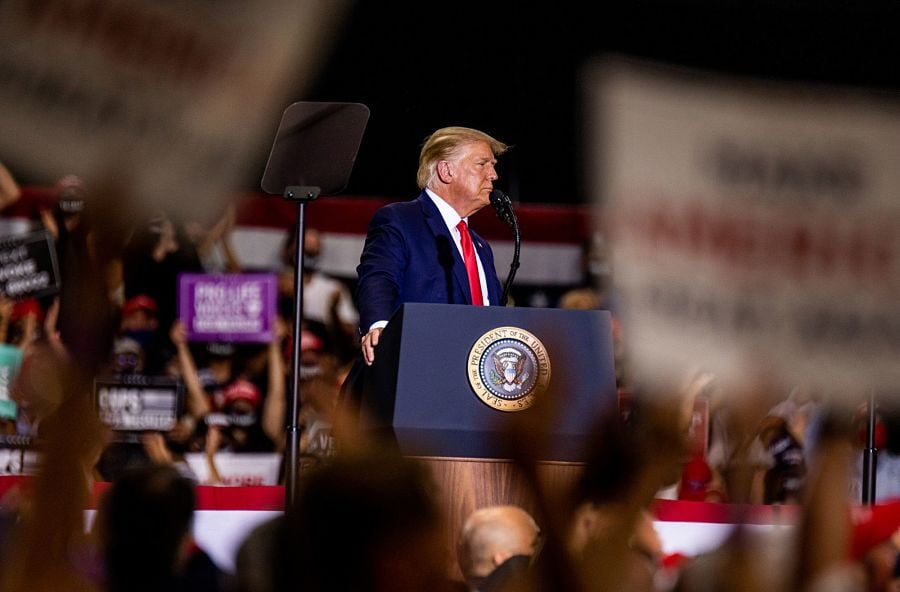

Donald Trump’s social media startup publicized a letter to the heads of various US House of Representatives committees, doubling down on claims that an illegal form of short selling may be hitting its stock.
Trump Media & Technology Group Corp. Chief Executive Officer Devin Nunes penned a letter asking for an investigation into the trading of the stock and whether laws including those governing racketeering and tax evasion were violated. The parent of Truth Social has flagged concern that so-called “naked” short sales, which involve betting against a stock without first borrowing shares, could potentially be occurring, hurting its loyal retail investors.
The stock has been volatile since going public four weeks ago, trading around $33 per share Wednesday, after hitting an intraday peak of $79.38 in its debut on the Nasdaq. Trump Media has captivated individual investors who piled into the stock and touted their investments across the Truth Social platform as a way to support Trump’s 2024 re-election campaign.
Trump Media’s letter is the latest salvo in a bid to place itself at the center of a battle between its supporters and Wall Street. The missive from Nunes, a former California Representative who left Congress to become CEO of Trump Media, echoed a note penned to Nasdaq Inc. Chair Adena Friedman seeking her help intervening against the potential naked short sales.
The startup’s roughly $4.5 billion valuation has drawn scrutiny, given it took in just $4.1 million in revenue last year and lost more than $50 million. By a traditional metric like price-to-sales ratio, the stock is valued at a more than 1,000 multiple. That’s more than 30 times the multiple of stock market darling Nvidia Corp., which is roughly 33 times.
Banned Shorts
While naked short selling is mostly banned, regular short selling — where investors borrow shares from current owners for a fee to then sell the stock, and ultimately buy back shares at a profit if the price falls — is permitted. The cost of borrowing Trump Media shares made it among the most expensive US stocks to bet against, with short sellers facing financing fees of some 700% at one point, according to financial analytics firm S3 Partners.
The SEC publishes a list of stocks with a high number of trades that fail to settle, which recently included Trump Media. Appearing on the list is a possible indicator of naked shorting activity, though it can also occur for “justifiable reasons”, including the inability to obtain borrowed shares, the regulator’s website shows.
In the letter to each of the Chairmen of the US House of Representatives’ Committee on the Judiciary, Committee on Financial Services, Committee on Ways and Means and Committee on Oversight and Reform, Nunes requested an investigation that would include trading data, trust and clearing information and reports that would show the total shares shorted since mid-February.
Trump Media reiterated in the letter its previous assertion that four market participants were responsible for over 60% of the extraordinary volume of the shares traded, including Citadel Securities, Virtu Americas, G1 Execution Services and Jane Street Capital. The data cited by Trump Media don’t necessarily reflect any unusual activity or indicate any wrongdoing.
A Citadel Securities representative previously rejected Trump Media’s claim and criticized Nunes for trying to “blame ‘naked short selling’ for his falling stock price.” A representative for Virtu declined to comment, and G1 and Jane Street didn’t immediately respond to requests for comment.
Despite the calls for investigations into the short activity, Matthew Tuttle, chief executive officer at Tuttle Capital Management, said that’s not the driver of Trump Media’s slide.
“Revenue and profits are their problems,” Tuttle said in an interview. “Is it going down because of naked short selling? No.”
Retail Campaign
Trump Media has been campaigning against the often-controversial practice of short selling on several fronts, offering advice last week on ways that retail investors could protect their shares from being lent to would-be short sellers.
Preventing further declines in Trump Media shares would also help preserve gains for insiders. Nunes, Trump and others have seen their stakes surge in value, yet they can’t sell until September due to a lock-up agreement. Their ability to cash in could be expedited if the company’s board, which accounts for a range of ex-members of his administration and his son, waives or pulls forward the expiration of the lock-up, and an April 15 filing is deemed effective by the US Securities and Exchange Commission.
After shares closed at $32.57 on Tuesday, Trump and other insiders cleared a hurdle that would deliver a 40 million share windfall — with 36 million earmarked for the former president. That would bring his stake in the company, with the earnout nearly 115 million shares, to some $3.7 billion on paper.
Nunes’s note also attached a December 2023 letter to financial regulators signed by 74 members of Congress related to Meta Materials Inc., a company with claims on Texas oil and gas assets. Nunes wrote that the alleged market manipulation and potentially naked short-selling described in the letter to the regulators suggested similarities with Trump Media’s experience.

Relationships are key to our business but advisors are often slow to engage in specific activities designed to foster them.

Whichever path you go down, act now while you're still in control.

Pro-bitcoin professionals, however, say the cryptocurrency has ushered in change.

“LPL has evolved significantly over the last decade and still wants to scale up,” says one industry executive.

Survey findings from the Nationwide Retirement Institute offers pearls of planning wisdom from 60- to 65-year-olds, as well as insights into concerns.
Streamline your outreach with Aidentified's AI-driven solutions
This season’s market volatility: Positioning for rate relief, income growth and the AI rebound
